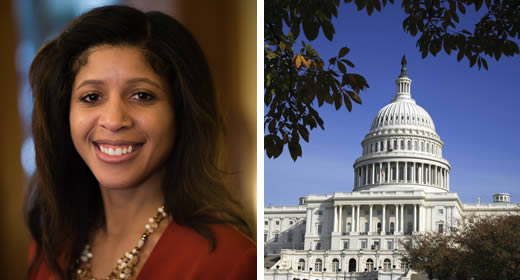
The Ford School is delighted to announce that Myra D. Lee (MPP ’16) will serve as the inaugural Riecker Michigan Delegation Fellow. Lee began her six-month assignment last week. She will support the work of U.S. Senator Debbie Stabenow (D-MI), ranking member of the Senate Agriculture, Nutrition, and Forestry Committee.
Myra Lee is a native Detroiter with extensive experience in urban agriculture, nutrition, and community development issues. With a bachelor’s degree in horticulture, environmental economics, and policy, Lee served as an AmeriCorps Detroit Fellow, as a program coordinator for Detroit’s Fair Food Network and Food Justice Task Force, and as the youngest member of the Detroit Food Policy Council. She is continuing her studies at the Ford School, and expects to earn her master’s in public policy in the winter of 2016.
“Knowing how to grow fruits and vegetables was a foundation,” says Lee of her undergraduate degree in horticulture and its relevance to this work. But working with Detroit food justice activists, she says, was inspirational. These mentors introduced Lee to the socioeconomic and racial disparities of the food system—both in access to locally grown, healthy food options for consumers and in access to jobs and entrepreneurial opportunities in the food industry as producers, distributors, and retailers.
The rise of cities and suburbs, the industrialization of food systems, and the specialization of jobs have cut many people off from their agrarian roots, Lee says, but this is even more true among the black community. “There’s been a stigma around agriculture in the black community,” she says. “The trauma of slavery has severed our relationship with the land and our knowledge of how to grow food. That relationship needs to be rebuilt so we can be more independent, have more choices, and have more power and influence over our food and our health.”
Lee says she has long had an appreciation for people’s stories, a form of qualitative data, but that she learned through her work with food security organizations to appreciate the value of quantitative data (a longtime strength of the Ford School) to reinforce the truth of lived experience and to find more systemic solutions to community challenges. Lee is particularly interested in using this knowledge to support the economic sustainability of women, who are critical to the stability of families and communities.
As a board member of the Ford School’s Women and Gender in Public Policy organization and vice chair of the Detroit chapter of the New Leaders Council, Lee sees Senator Stabenow as a pioneer and a model of women’s leadership.
“She’s placed food and nutrition policy on the national agenda,” says Lee. “A lot of times agricultural policy is dominated by rural concerns, but she’s championed legislation that funds urban farmer’s markets, summer school meal programs, and community-based nutrition education, which also benefits urban growers and residents.”
Lee’s chief goal, she says, is to be an active contributing member of Senator Stabenow’s team while learning more about federal policies that impact Detroit and communities with similar profiles. “I’ve lived and worked in Detroit for years,” says Lee, “so I have a personal investment in bringing back that knowledge to provide evidence-based solutions to cities that have similar challenges and policy barriers.”
The Riecker Michigan Delegation Fellowship, a permanently endowed fellowship at the Gerald R. Ford School of Public Policy, was established in 2015 through an estate gift from Margaret Ann “Ranny” Riecker, a longtime friend and generous benefactor of the Ford School. Through a supplemental gift from the Harry A. and Margaret D. Towsley Foundation (which Ranny Riecker served for more than 50 years), the Ford School will be able to add an additional fellow in the years ahead to offer this opportunity to more members of the Michigan delegation.
